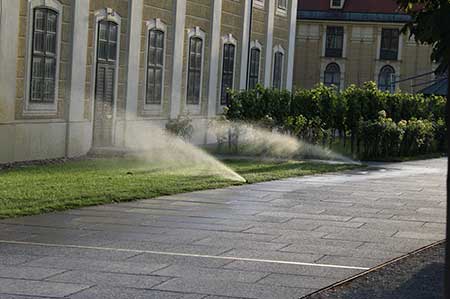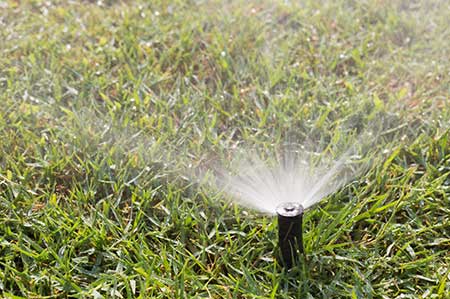Frequently Asked Questions
How often should sprinkler systems be inspected?
The frequency of sprinkler system inspections is crucial for optimal performance. It is recommended to have your system inspected at least once a year, ideally in the spring, to ensure all components are functioning properly and to address any maintenance needs.
Do you offer emergency sprinkler system repair services?
A.A. Waters & Brookes offers emergency sprinkler system repair services to promptly address any urgent issues, ensuring your lawn receives the necessary care to thrive. Our experienced team is ready to assist you at any time.
What is the cost of sprinkler system repair services?
The cost of sprinkler system repair services varies based on the complexity of the issue and required parts. Generally, rates can range from $75 to $150 per hour, along with potential charges for materials.
What kind of training do sprinkler techs receive?
Sprinkler techs receive specialized training in system installation, maintenance, and troubleshooting, often including certifications in irrigation techniques, water conservation practices, and safety protocols to ensure efficient and effective service.
What are the physical demands of being a sprinkler tech?
The physical demands of being a sprinkler tech include lifting heavy equipment, working in various weather conditions, and performing tasks that require bending, kneeling, and standing for extended periods. This role often involves manual labor and physical endurance.
How many years of experience do sprinkler techs need?
Sprinkler technicians typically need at least 2 to 5 years of experience to ensure they are skilled in system installation and maintenance. This experience helps provide quality service and effective solutions for your lawn care needs.
What tools do sprinkler techs commonly use on the job?
Sprinkler techs commonly use a variety of tools for their work, including wrenches, pipe cutters, trenchers, and pressure gauges to install and maintain sprinkler systems efficiently.
What types of sprinkler systems do you service?
A.A. Waters & Brookes services a variety of sprinkler systems, including residential, commercial, drip irrigation, and smart irrigation systems, ensuring proper maintenance and installation tailored to your lawn care needs.
How do I know if my sprinkler system needs repair?
The signs that your sprinkler system needs repair include irregular water coverage, visible leaks, inconsistent pressure, or brown patches in your lawn. Regular maintenance checks can help identify these issues before they worsen.
How often should I schedule sprinkler system maintenance?
The frequency of scheduling sprinkler system maintenance is essential for optimal performance. It is recommended to have professional maintenance at least once a year, ideally in spring, to ensure efficient watering throughout the growing season.
Can I get a free estimate for sprinkler system installation?
You can receive a free estimate for sprinkler system installation from A.A. Waters & Brookes. Contact us to schedule an appointment, and our experts will assess your lawn and provide a detailed quote tailored to your specific needs.
What is the job description of a sprinkler technician?
The job description of a sprinkler technician involves installing, maintaining, and repairing sprinkler systems to ensure optimal performance, efficiency, and water conservation for lawns and landscapes.
What certifications do sprinkler techs typically need to obtain?
Sprinkler techs typically need to obtain certifications such as the Irrigation Association's Certified Irrigation Contractor (CIC) and state or local licenses that comply with regulations. These credentials ensure they are knowledgeable in installation and maintenance practices.
Are sprinkler techs in high demand in certain regions?
Sprinkler technicians are in high demand in certain regions, particularly where landscaping and lawn care are prioritized due to climate and residential development. Areas with warmer climates often see an increased need for their expertise.
Can sprinkler techs work on both residential and commercial properties?
Sprinkler techs can work on both residential and commercial properties. They are trained to handle the unique requirements and complexities of irrigation systems in various settings, ensuring optimal performance and maintenance for all types of properties.
Are your sprinkler system technicians certified?
A.A. Waters & Brookes ensures that all our sprinkler system technicians are certified and highly trained. This guarantees that you receive expert service and installation for your sprinkler system needs, ensuring optimal performance and customer satisfaction.
Do sprinkler techs need a degree to get hired?
Sprinkler techs do not need a degree to get hired. Instead, practical experience and certification in sprinkler system installation and maintenance are often preferred by employers like A.A. Waters & Brookes.
What are common issues with sprinkler systems?
Common issues with sprinkler systems include leaks, clogged spray heads, damaged pipes, and improper coverage. Regular maintenance can help identify and resolve these problems, ensuring your lawn receives consistent and effective watering.
How can I optimize my sprinkler system efficiency?
Optimizing your sprinkler system efficiency involves regularly checking for leaks, adjusting spray patterns, and setting timers based on weather conditions. Additionally, implementing a smart irrigation control system can greatly enhance water usage efficiency.
What are signs of a malfunctioning sprinkler?
Signs of a malfunctioning sprinkler include inconsistent water coverage, visible dry spots on the lawn, pooling water, misting instead of spraying, and damaged or broken sprinkler heads. Addressing these issues promptly ensures optimal lawn health.
Can I use recycled water in my sprinkler system?
Recycled water can be used in your sprinkler system, provided it meets local regulations and safety standards. Always consult with local authorities and a qualified installer to ensure proper use and compliance.
What features should I look for in a sprinkler system?
The features to look for in a sprinkler system include adjustable spray patterns, a timer for scheduling, efficient water usage, durability and weather resistance, as well as compatibility with smart home technology for enhanced control.
How do smart controllers improve sprinkler performance?
Smart controllers enhance sprinkler performance by adjusting watering schedules based on real-time weather data and soil moisture levels. This ensures optimal hydration, reduces water waste, and promotes healthier lawns throughout the growing season.
What maintenance tasks prolong sprinkler system lifespan?
The maintenance tasks that prolong a sprinkler system's lifespan include regular inspections, cleaning of the nozzle heads, checking for leaks, adjusting the sprinkler alignment, and winterizing the system to prevent damage from freezing temperatures.
Are automatic systems worth the investment?
Automatic systems are indeed worth the investment. They enhance the health and appearance of your lawn by ensuring consistent watering, save you time and effort, and can ultimately reduce water waste, leading to cost savings in the long run.
What is involved in winterizing a sprinkler system?
Winterizing a sprinkler system involves draining water from the pipes, blowing out residual moisture with compressed air, and shutting down the control system to prevent damage during freezing temperatures. This process ensures the longevity and efficient operation of your system.
How do I adjust spray patterns on my sprinkler?
Adjusting the spray patterns on your sprinkler involves rotating or adjusting the nozzle. Most sprinklers have a specific mechanism, often a dial or screw, that allows you to change the direction and range of the spray to suit your lawn's needs.
What are the benefits of drip irrigation systems?
The benefits of drip irrigation systems are numerous; they conserve water by delivering it directly to plant roots, reduce weed growth, ensure even moisture distribution, and improve plant health, all while promoting efficient nutrient uptake.
What safety precautions do sprinkler techs follow?
Sprinkler techs follow several safety precautions to ensure a secure working environment, including wearing protective gear, using proper tools, and adhering to electrical and irrigation codes to prevent accidents and ensure system functionality.
How can I prevent sprinkler system run-off?
To prevent sprinkler system run-off, adjust your sprinkler heads to ensure even water distribution, set timers to water during cooler parts of the day, and regularly check for leaks or clogs in your system.



